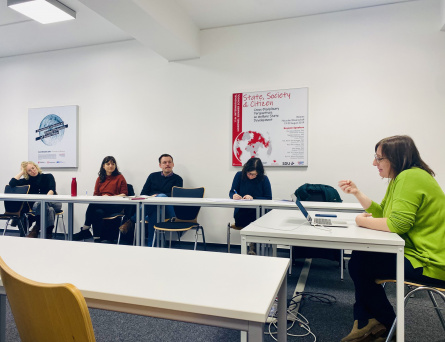
The controversy between free trade and labor standards was the central field of tension in Lucia Coppolaro’s Jour Fixe lecture on Wednesday, January 31. In her presentation she addressed the role of the General Agreement on Tariffs and Trade (GATT) and the World Trade Organization (WTO). Prof. Coppolaro gave a historical overview of the interplay between trade liberalization on the one hand and social welfare on the other hand.
The central argument of Prof. Lucia Coppolaro’s presentation was the predominant role that globalization played in the tension between labor standards and free trade, in more general terms, between social policy and trade policy. Using an historical perspective reaching from the establishment of the GATT agreement in 1948 to the end of the 20th century, she explained that the processes summarized under the term globalization were the initial driving forces behind the discussion concerning social clauses. But apart from being the enabling factor that made labor standards part of a multilateral debate, globalization was also the reason that social clauses had not been included in the GATT regulations, neither in the WTO’s agenda and continue without strong recognition by the latter until today. Free trade, different to what has been proclaimed, was not a transmitter of social welfare that equally successfully trading countries would increase their spending on. Labor standards, whenever debated, served as a possibility to support protectionist agendas of wealthy countries such as the US towards so-called developing countries marginalized by the GATT and WTO later on.
Abstract: The interplay between trade liberalization—a cornerstone of globalization—and social welfare constitutes a pivotal and contentious subject in contemporary political discourse. This controversy has surrounded the World Trade Organization (WTO) and its antecedent, the General Agreement on Tariffs and Trade (GATT), since 1947, both of which have played important roles in promoting trade liberalization. Central to this debate is the connection between free trade and labor standards, specifically the proposition of integrating a social clause within trade liberalization agreements. The discourse has ebbed and flowed in tandem with the globalization wave. Initially broached in 1947, the topic lay dormant until the late 1960s, a period when trade liberalization, chiefly orchestrated by Western nations with comparable policies and labor standards, went unchallenged. The dynamic shifted in the 1970s as nations with lower wages and labor standards entered the global market, propelling the issue to prominence in Geneva. With the ascent of new economies capable of competing in developed markets, the discourse over the interrelation of free trade and labor standards acquired a global dimension and became a focal point within the GATT framework. Despite heightened discussions in the mid-1990s, little progress was made on the social clause, mainly due to the resistance from emerging economies that had accrued substantial negotiation leverage in Geneva. The emergence of global economic integration in the 1970s underscored the disparities between competing nations at varying developmental stages, revealing the complexities of the trade-labor nexus. Concurrently, the burgeoning influence of emerging economies in global commerce altered the power dynamics within the GATT/WTO, effectively stalling the labor standards debate in Geneva.
Lucia Coppolaro is Associate Professor in International History at the Department of Political Science, Law and International Studies of the University of Padova, Italy. Her research is primarily focused on international economic institutions and international trade. She has published numerous articles on the EU trade policy and the evolution of trade liberalization under the auspices of GATT/WTO in journals, including Contemporary European History and The International History Review.
Kontakt:
Fabienne Müller













